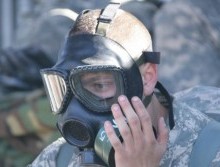
Did ISIS capture chemical weapons? Illustrative photo of soldier training. Photo courtesy of Mr James Brabenec (IMCOM)
The ISIS terrorist group, also known as ISIL or the Islamic State (IS), may have acquired some of the world’s deadliest weapons and may have already used them. The Middle East Review of International Affairs (MERIA) Journal reported that Kurdish activists said ISIS used chemical weapons in July in the Kurdish region of Kobani, and photo evidence obtained by MERIA seems to back up the belief.
Dr. Jonathan Spyer, author of the MERIA report, wrote that Israeli experts had reviewed the photos and said the burn wounds shown in them appeared to be from an agent such as mustard gas. However, they could not be certain of this.
Dr. Spyer, an expert for the Global Research in International Affairs (GLORIA) Center, wrote that ISIS may have acquired the weapons from Iraq. He cites a CIA article that mustard gas was found at a facility in the country.
ISIS has controlled territory in two nations with a known history of chemical weapons—Syria and Iraq.
Meanwhile, the Kobani region is currently a target of ISIS and on Wednesday US General John Allen noted the US is using airstrikes to help out the Kurdish forces there “to give some time to the fighters to organize on the ground.”
Gen. Allen, in comments released by the State Department, refused to assign victory to either side at this point in the broader fight with ISIS.
“I’d be careful about assigning a winner or a loser,” said Gen. Allen, the Special Presidential Envoy for the Global Coalition to Counter ISIL. “We had come in early along with the intention that the airstrikes were to buy white space to impede the tactical momentum of ISIL. And that in fact has occurred in some areas. They still retain some tactical momentum in other areas, and that’s to be expected. We’re only new into this strategy.”
(By Joshua Spurlock, www.themideastupdate.com, October 16, 2014)
